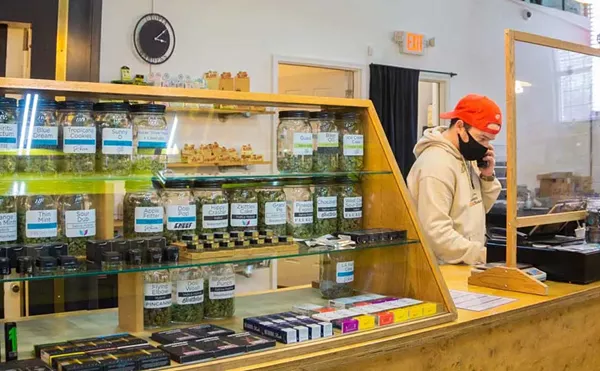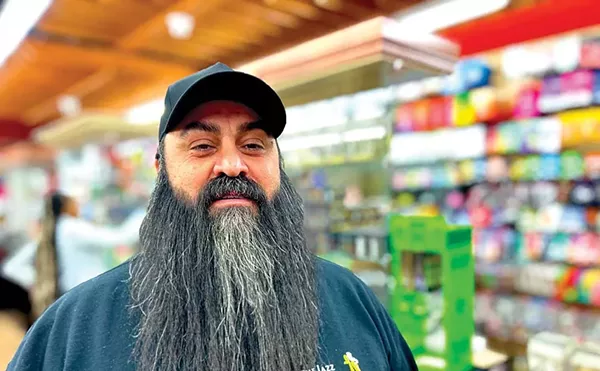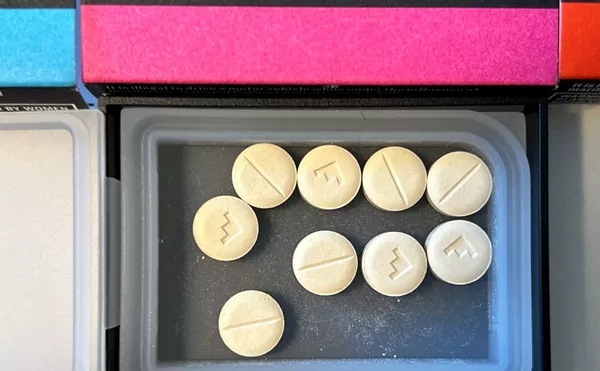
Audio By Carbonatix
[
{
"name": "GPT - Leaderboard - Inline - Content",
"component": "35519556",
"insertPoint": "5th",
"startingPoint": "3",
"requiredCountToDisplay": "3",
"maxInsertions": 100,
"adList": [
{
"adPreset": "LeaderboardInline"
}
]
}
]
Legalized medical marijuana has helped remove the looming physical and mental presence of the narcotics police from our lives for the first time since we started smoking weed. If we have a patient ID card, we're protected from arrest and imprisonment for our daily smoking activities, and we can replenish our supplies from our licensed caregivers without fear of intervention by the police on either end of the transaction.
This breakthrough in the criminally elongated War on Drugs is a great thing for those of us with physical or mental ailments for which we've sought treatment from our physicians and ended up as certified medical marihuana patients.
But it does nothing for the millions of Americans who enjoy marijuana or other criminal substances on a recreational basis but suffer arrest, prosecution, jailing, drug testing, job loss, mandatory treatment programming, draconian probation or parole supervision, and other chilling punishments simply because they like to get high.
When I did my time for marijuana offenses some 40 years ago, the police forces were just beginning to find us as ugly blips on their cultural radar screens, and there weren't very many of us in confinement.
I served six months in the old Detroit House of Correction in 1966 for possession of less than an ounce of weed, and then two-and-a-half years of a 9-1/2- to 10 year-sentence in Jackson and Marquette as a maximum security prisoner of the state of Michigan for the crime of giving two joints to an undercover policewoman from the Detroit Narcotics Squad.
Since the reviled Richard M. Nixon administration seized on the recreational drug issue in a big way and triggered the War on Drugs against an innocent and helpless populace involved in mental and sensual stimulation of various sorts, prosecution of this vicious campaign has stimulated the growth of a vast police state mechanism of almost unbelievable proportions.
"The United States jails, imprisons and correctionally monitors (supervision, probation, parole) more people than any other nation in the world," Charles Shaw asserts in his new online memoir Exile Nation: Drugs, Prisons, Politics & Spirituality, "around six million, or one out of every 50 Americans. Most are for nonviolent drug offenses.
"This 'correctional economy' which comprises the police, courts and prisons, accounts for millions of jobs and billions of dollars. At the same time, state budgets are so overwhelmed they can't afford to hold all the prisoners they have jammed into their systems like animals on a factory farm [while] marijuana is the No. 1 cash crop in America."
I met Charles Shaw in London this past week, when I attended his lecture about the War on Drugs at the Hub in Kings Cross. He was showing footage of his interviews with a wide variety of recreational drug users and victims of the drug wars that he's recorded for his current film project, Unheard Voices.
Shaw is a fellow ex-convict and a close friend of my pal Dimitri Mugianis, the ex-dope fiend and former Detroiter who cleaned up his habit with the help of iboga and has since dedicated himself to treating addicted persons all over the Western world as an underground iboga healer. Both have turned their bitter experiences with the culture of addiction and the minions of drug law enforcement into inspiration for their committed activism on behalf of the people's side of the War on Drugs.
Charles and Dimitri met when Shaw was filming his two-part documentary The Iboga Insurrection (Parts 1 & 2), which "delves into the history and typology of the ibogaine underground, with evangelizing addicts and lay-providers, activists, medical researchers and shamans."
Shaw's credentials are stunning. He serves as editor for the openDemocracy Drug Policy Forum and the Dictionary of Ethical Politics, both collaborative projects of Resurgence, openDemocracy, and the Tedworth Charitible Trust. He's written for everybody from Alternet and Alternative Press Review to the Huffington Post and the New York Times; he's the founder and publisher of Newtopia and former head writer for the nationally syndicated radio show Reality Checks.
Shaw's new book, Exile Nation, now appearing serially on the Reality Sandwich website throughout 2010 (tinyurl.com/yj6lk3c) is a memoir of his life as a writer, addict, activist, prisoner and spiritual seeker — as he puts it, "a mosaic of his descent into shadow, his personal reckoning, and the long slow crawl back out to reclaim his life, heal the past, and start over."
This guy knows the issue from the inside, and has a lot to teach the casual bystanders of the War on Drugs, whose support must be enlisted in order to bring this dreadful episode in our national history to a shuddering conclusion. I saw him win over an audience of normal citizens of the United Kingdom, who were visibly shocked by the images confronting them on the screen.
A native of Chicago, Shaw spent the first few years of the century as a radical journalist, political activist and habitual drug user in Los Angeles, Chicago, New York, Boston and San Francisco, before he was arrested, tried and sentenced to a one-year prison sentence for possession of 14 capsules of MDMA.
He did his time for the Illinois Department of Corrections in the Cook County Jail in Chicago, Stateville prison in Joliet, and the East Moline Correctional Center, and then — "released from prison, unable to find meaningful work, and alienated from nearly everyone in his life" — Shaw backslid into a state of suicidal depression before what he calls his "rebirth and spiritual awakening" led him into "meaningful work, shamanic medicines, love and community."
There's an addendum to the book titled "The Secret History of the War on Drugs" that will open the eyes of even the best-informed student of this historical monstrosity. Shaw examines the global drug trade and the war on drugs "as a means of foreign policy, covert operation, domestic policy and social control. Highlights include the role of U.S. intelligence services in the drug trade and in the psychedelic community, the connection between drug laws and racism, and how crack and heroin were intentionally used to destroy the African-American community."
This is some heavy shit, but really it's just the tip of the iceberg in terms of the extent to which the War on Drugs has poisoned our society and turned millions of harmless citizens into criminals and convicts whose lives have been seriously damaged by the forces of law and order merely for attempting to alter their consciousness.
With the tide of public opinion finally rising up over the carefully constructed dams of ignorance and official disinformation to challenge the feasibility and the very basis of the War on Drugs, the one relentless question remains: How long are we going to stand for this shit? We've got them on the ropes — it's time to finish them off now and reclaim our country from the warmongers who operate what Dr. Kevin Danaher of Global Exchange has called "the largest working railroad in America: the criminal justice system."
This week I'll be attending the Cannabis Cup in Amsterdam and reporting from the festivities, as well as weighing in on some of the recent negative developments in the Dutch cannabis community being proposed by the new right-wing government of the Netherlands. In the meantime, as the vipers used to say, "Light up and be somebody!" —London, Nov. 19, 2010





